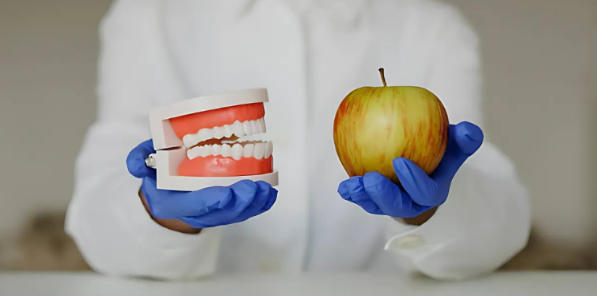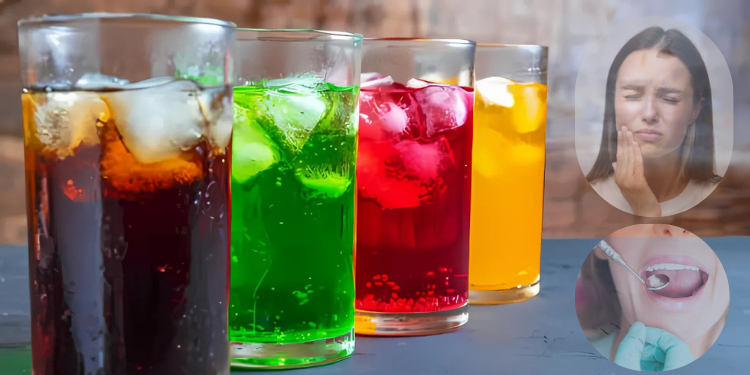
Good oral health is not only about brushing and flossing .What we eat plays a significant role in preventing tooth decay. The foods and drinks we consume can either protect our teeth or contribute to damage over time. Understanding the connection between diet and oral health can help you make better choices to preserve your teeth, gums, and overall well being.
Tooth decay begins when harmful bacteria in the mouth metabolize sugars from the foods we eat, producing acids that break down the enamel on the hard outer surface of the tooth. This demineralization weakens the enamel, making it more vulnerable to cavities, bacteria, and tooth loss. While oral hygiene practices like brushing and flossing are crucial, the food we eat has an equally important impact on the health of our teeth.
How Diet Affects Tooth Development and Strength

Proper nutrition is vital not just for overall health, but for the development of strong, healthy teeth. Even before our teeth emerge, poor nutrition during pregnancy and early childhood can impair the formation of tooth enamel, leading to weak teeth that are more prone to decay. Essential vitamins and minerals; such as calcium, vitamin D, vitamin A, and protein, are particularly important during the early stages of tooth development. A deficiency in these nutrients can prevent proper enamel formation and mineralization, making teeth more susceptible to decay.
Calcium and vitamin D, for example, are essential for tooth mineralization. Calcium strengthens the tooth structure, while vitamin D helps the body absorb and use calcium effectively. Without these nutrients, enamel remains weak, and teeth are more vulnerable to the harmful effects of acids from food and bacteria.
The Primary Cause of Tooth Decay

Sugar consumption is the leading factor in tooth decay. Bacteria in the mouth feed on sugars, producing acids that erode tooth enamel and cause cavities. While natural sugars in whole fruits, vegetables, and dairy have less impact on teeth due to additional protective nutrients, refined sugars in candy, soda, and baked goods are more harmful. These sugars are quickly broken down by bacteria, leading to greater enamel damage.
The Frequency of Sugar Consumption Matters
The frequency of sugar consumption is just as important as the amount when it comes to tooth decay. Constant snacking on sugary foods provides bacteria with a steady source of sugar, leading to more frequent acid attacks on teeth. Eating large amounts of sugar at once can also cause prolonged acid exposure, which weakens enamel. This is especially problematic when sugary foods or drinks are consumed before bed, as reduced saliva production during sleep leaves teeth more vulnerable to decay.
Foods That Help Prevent Tooth Decay

Fortunately, a well balanced diet can help prevent tooth decay. Foods rich in vitamins and minerals are essential for maintaining healthy teeth. Dairy products like milk, cheese, and yogurt are excellent sources of calcium, which strengthens enamel. Calcium also works alongside vitamin D, which helps the body absorb and use calcium effectively. Together, these nutrients play a key role in fortifying tooth structure and preventing decay.
High fiber foods, such as fruits, vegetables, and whole grains, also play an important role in dental health. Fiber rich foods stimulate saliva production, which helps neutralize acids and wash away food particles. Additionally, chewing fiber rich foods can provide a natural cleaning action for teeth, removing plaque and reducing the amount of sugar that sticks to the teeth.
Cheese, in particular, is a powerful protector of tooth health. It not only provides calcium but also stimulates saliva production and raises the pH in the mouth, which can reduce the risk of cavities. Similarly, other foods like nuts and seeds contain minerals that can help maintain healthy teeth and gums.
The Role of Saliva in Oral Health
Saliva is essential for protecting teeth from decay. It helps neutralize acids, wash away food particles, and provide minerals that remineralize enamel. A diet that supports healthy saliva production is key to preventing tooth decay. Nutrients like vitamin A, zinc, protein, and iron are important for promoting healthy saliva flow.
Acidic Foods and Drinks

Certain foods and drinks can erode tooth enamel, increasing the risk of decay. Acidic substances, such as citrus fruits, soda, and certain flavored teas, can wear down enamel over time. The acid content in these foods softens the enamel, making it more susceptible to decay. While it’s impossible to completely avoid acidic foods, it’s important to consume them in moderation and take steps to protect your teeth.
One way to reduce the risk of enamel erosion from acidic foods is by drinking water after consuming these items. Water helps rinse away acids and food particles, reducing their potential to harm your teeth. Drinking milk or eating cheese after consuming acidic foods can also help neutralize acids and strengthen enamel.
Sweeteners That Are Safe for Teeth
In addition to limiting refined sugars, choosing sugar substitutes can help protect your teeth. Artificial sweeteners like aspartame, sucralose, and saccharin are not metabolized by oral bacteria, so they do not contribute to tooth decay. Sugar alcohols, such as xylitol, sorbitol, and erythritol, are also not broken down by bacteria and can actually help reduce the risk of cavities. In fact, research has shown that xylitol can inhibit the growth of decay causing bacteria and stimulate saliva production, making it a great option for sugar free gum and candies.
Treating tooth decay involves a combination of professional dental care and at home strategies to stop further damage and restore oral health. If tooth decay is detected early, a dentist may recommend a filling to repair the damaged enamel and prevent the decay from spreading. In more severe cases, a root canal or crown may be necessary to save the tooth. Regular dental check ups are essential for early detection and treatment of cavities. Alongside professional treatment, improving dietary habits can significantly aid in preventing future decay.
At Smile Center, our mission is to help you achieve a healthier tomorrow starting today. We understand that oral health is an essential part of your overall well being, and we're here to guide you every step of the way. You can contact us for All on 6 Implants Turkey services and many more treatments. You can find our contact information on our website. Remember, Smile Center is always here to support you on your journey to a brighter, healthier smile!
REFERENCES;
-
Gondivkar SM, Gadbail AR, Gondivkar RS, Sarode SC, Sarode GS, Patil S, Awan KH. Nutrition and oral health. Dis Mon. 2019 Jun;65(6):147-154.
-
Hujoel PP, Lingström P. Nutrition, dental caries and periodontal disease: a narrative review. J Clin Periodontol. 2017 Mar;44 Suppl 18:S79-S84.


